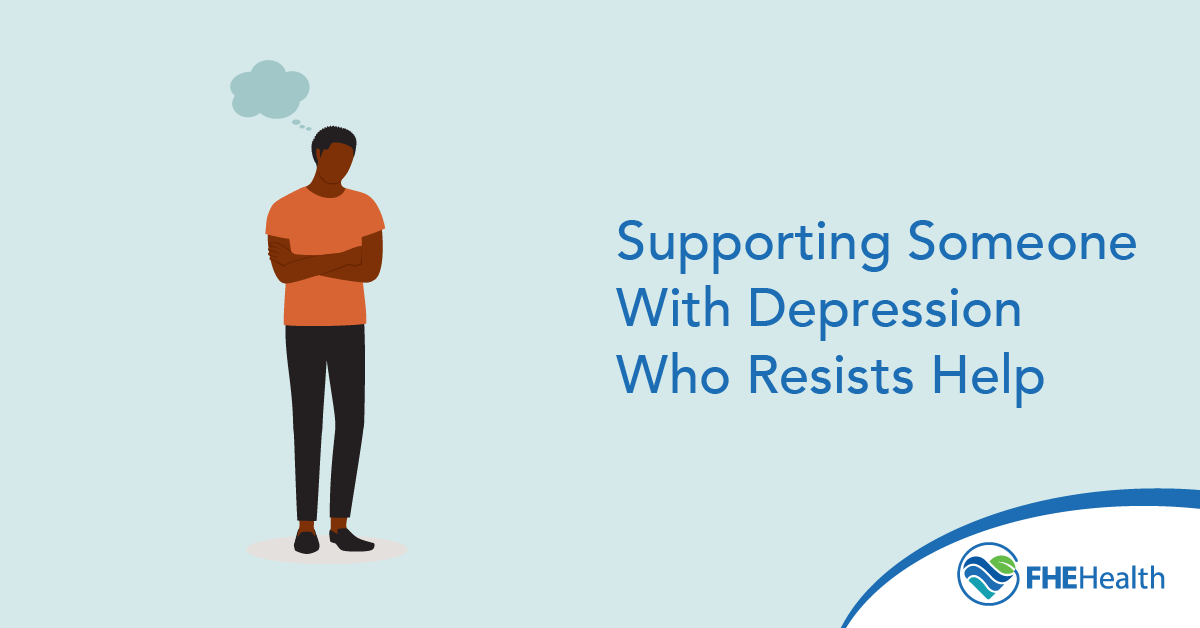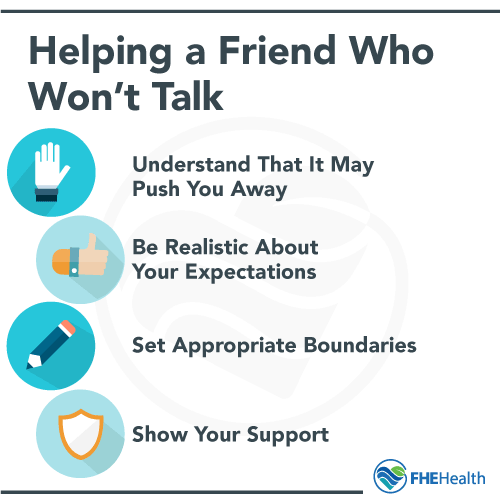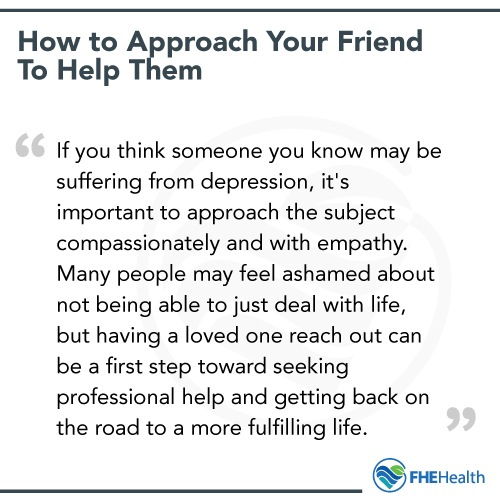
Maybe you’ve noticed that a friend or loved one doesn’t hang out as much as they used to or that they always have an excuse for why they can’t join social outings. Or maybe you’ve seen a decline in caring about personal appearance or the cleanliness of their home. While everyone has busy stages of life where they skip hair washing day or don’t get to the dishes or laundry, these can also be warning signs that someone is struggling with depression.
It’s normal to be unsure how to talk to a person with depression without making the situation worse — comments like “just cheer up” or “I don’t understand why you think your life is so bad” aren’t helpful — but there are some things you can do to be supportive during this time. Understanding how being depressed affects a person’s life is the first step in figuring out how to help a friend with depression.
How to Help Someone with Depression Who Won’t Talk
Everyone has had a bad day, been in a bad mood or experienced a difficult time in their lives, but this isn’t the same as being depressed. And if you’ve never experienced a major depressive disorder, it can be very difficult to understand how it affects everything in your life and can make even the smallest tasks difficult.
Some common but not-so-helpful ways people may try to cheer up a depressed person include telling them the situation isn’t as bad as it seems, acting as if they can just magically get out of depression with the right playlist or a walk around the block, or trying to commiserate too much and ending up enabling the person into even more negative behaviors.
While these are all usually done out of concern for your loved one, it can be frustrating when people with depression aren’t getting better. The truth is that depression is isolating and can be a complex mental health condition. It requires a combination of various therapeutic techniques and often medication to start seeing an improvement in symptoms of depression.
However, this doesn’t mean you can’t still be of help. Here are some ideas on how to help a friend with depression.

Understand That They May Push You Away
Due to misleading beliefs about the condition, nearly 60% of people with depression don’t seek help. One of the most frustrating aspects of trying to help a depressed friend is that they may push you away and seem like they don’t want or appreciate your efforts. If you’re taking time out of your schedule and trying to prioritize their needs, you may start to feel used, taken advantage of or unappreciated. However, it’s important to understand that pushing people away is a big part of struggling with depression.
It could be that the person is ashamed and doesn’t want you to see how bad things have gotten from a life-management perspective, or they could be struggling with poor self-esteem that makes them feel like they’re a burden on others or unworthy of help. The best thing you can do in these situations is to keep reaching out without being pushy — call to check in but don’t guilt-trip the person into coming out with you for coffee — and remind them that you love them, care about their well-being and are there whenever they’re ready.
Be Realistic About Your Expectations
Dealing with depression is exhausting, and it can make even something as small as taking a shower seem insurmountable, which means it’s essential to be realistic about your expectations when it comes to how someone manages their mental health. Doing a load of laundry and putting it away could be a huge achievement for someone struggling with depression, and it’s important not to negate these triumphs as just being “normal things.”
Even those who are actively dealing with their depression will face setbacks, since depression, like any recovery process, isn’t linear. You may wonder during these times whether your friend will be okay, or what’s a normal life difficulty and what requires intervention. The best thing you can do to support someone with depression is to keep the lines of communication open. That way, you’re aware of what’s going on and the other person has the best chance of feeling comfortable talking to you about it.
Set Appropriate Boundaries
When trying to figure out how to help a depressed friend, the focus should be on them, but it’s also critical to protect your own mental health. Being a support person is fine, but it shouldn’t be at the sacrifice of your own work, personal or social life, and it shouldn’t cross over the line into enabling.
Before you get too involved in someone else’s life, take time to reflect and create some ground rules for yourself about how you’ll handle certain situations and how much you want to be involved. You may also consider what you’ll do if the other person doesn’t want your help or isn’t interested in trying to effect change in their own life, because that’s a critical first step in dealing with a mental illness such as depression.
What to Avoid Saying or Doing
When someone you care about is struggling with depression, one of the most important things you can do is resist the urge to offer advice or opinions. Even if your intentions are good, phrases like “You should try…” or “Why don’t you just…” can feel invalidating. It’s not your job to fix the situation, and trying to do so can make the other person feel misunderstood or pressured. Avoid making judgments, even if you’re not placing blame. Comments that hint at frustration or disappointment can shut the person down instead of opening them up.
Instead of pushing them to act or “snap out of it,” focus on being present and consistent. It’s okay to make gentle plans, such as suggesting a short walk or offering to bring over food, but don’t pressure them to commit. Let them know it’s fine to say no or change their mind. The goal isn’t to cheer them up or fix anything but to remind them they’re not alone. Small, quiet moments of connection can be more meaningful than big gestures. Your patience and willingness to stick around when things are heavy or uncertain are what will make the difference.
Show Your Support

If you’re not sure how to show support, the first step is to just let the other person know that you care and you’re available. You can do this with a phone call or text or by having a face-to-face discussion where you show your concern for what’s happening.
Depending on the person’s situation, you could also offer to pitch in with some laundry or bring over dinner one night, but it’s crucial not to suffocate the person either. You want to show that you’re there to help but still respect that they’re an adult who has the right to their own life choices.
Make sure to listen without judgment. If a friend opens up about feeling depressed, try something simple and steady like “Thanks for telling me. I’m not here to fix it, but I’m here to listen. If you want to talk, I’ve got time.” You don’t need perfect words. Just being there, staying calm and not jumping in with solutions can go a long way.
If you think someone you know may be suffering from depression, it’s important to approach the subject compassionately and with empathy. Many people may feel ashamed about not being able to just deal with life, but having a loved one reach out can be a first step toward seeking professional help and getting back on the road to a more fulfilling life.
Encouraging Professional Help
If your friend hasn’t already connected with a therapist or doctor, you can gently suggest it without making it sound like an ultimatum. Try saying something like “Have you thought about talking to someone? It might help to have support that isn’t just from friends.” Emphasize that seeking help isn’t a sign of weakness but a step toward feeling better. Offer to help them find options or go with them if that feels supportive. What matters most is that the suggestion comes from a place of care, not pressure. They need to make the choice for themselves in their own time.
FHE Health has mental health professionals on staff who can help those suffering from depression start getting back to their lives and assist those around them in understanding how to be as supportive as possible. If you or a family member is seeking treatment, contact FHE Health.






